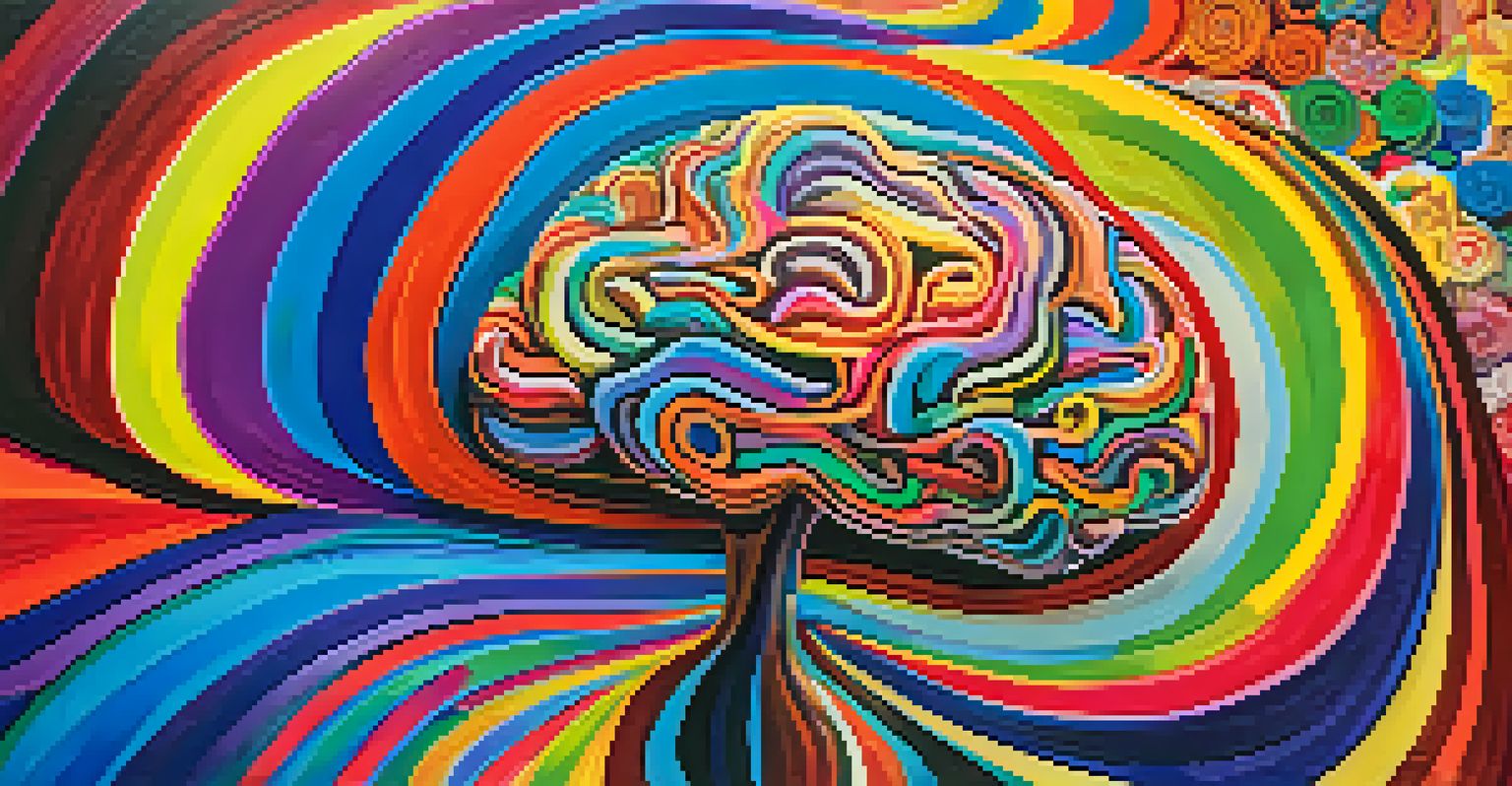Psychedelics and Cytokine Release: What We Know So Far

Understanding Psychedelics: A Brief Overview
Psychedelics are substances that alter perception, mood, and cognitive processes. They have been used for centuries in various cultures for spiritual and therapeutic purposes. In recent years, there's been a resurgence of interest in their potential benefits, particularly in mental health treatment.
Psychedelics may have the potential to help us understand the connections between our mental and physical health.
Common psychedelics include psilocybin (found in mushrooms), LSD, and DMT. These substances are often associated with profound personal experiences, leading some to wonder how they interact with our biological systems. One area of focus is their effect on the immune system, particularly cytokine release.
Cytokines are small proteins that play a crucial role in cell signaling in the immune system. They can promote inflammation or anti-inflammatory responses, which is essential for maintaining health. Understanding how psychedelics influence cytokine release could unlock new therapeutic avenues.
The Role of Cytokines in the Immune System
Cytokines act as messengers between cells, coordinating the body's response to infections and injuries. When the body detects a threat, it releases various cytokines to signal immune cells to respond. This process is vital for fighting off pathogens but can become problematic if the response is excessive.

For instance, an overproduction of pro-inflammatory cytokines can lead to chronic inflammation, which is linked to several health issues, including autoimmune diseases and depression. Therefore, understanding how to modulate cytokine release is crucial for developing new treatments.
Psychedelics and Mental Health
Psychedelics like psilocybin are being researched for their potential to alleviate mental health issues, such as depression and PTSD.
By exploring how psychedelics interact with cytokine signaling, researchers hope to find new ways to manage inflammation and promote healing. This connection is particularly relevant for conditions where inflammation plays a role, such as PTSD and major depressive disorder.
Current Research on Psychedelics and Cytokines
Research into the relationship between psychedelics and cytokine release is still in its infancy. Preliminary studies indicate that psychedelics may influence cytokine production, potentially leading to anti-inflammatory effects. For example, some studies suggest that substances like psilocybin can reduce levels of certain pro-inflammatory cytokines.
The future of medicine lies in the ability to harness the therapeutic potential of psychedelics to treat some of our most challenging health conditions.
These findings are exciting because they suggest psychedelics could help treat conditions characterized by chronic inflammation. However, much of this research is still in the early stages, and more extensive studies are needed to confirm these effects and understand the underlying mechanisms.
As scientists delve deeper, they are also looking into how individual differences, such as genetics and existing health conditions, might influence the response to psychedelics and their impact on cytokines. This personalized approach could lead to more effective therapies.
Psychedelics in Clinical Trials: What We Know So Far
Several clinical trials are currently investigating the therapeutic potential of psychedelics, focusing on conditions like depression, anxiety, and PTSD. These trials often measure various biological markers, including cytokine levels, to assess the immune response. Early results have been promising, showing significant improvements in mental health symptoms.
For example, a study on psilocybin therapy for depression indicated not only improvements in mood but also changes in inflammatory markers. Participants showed reduced levels of specific cytokines associated with inflammation, suggesting a dual benefit of mood enhancement and immune modulation.
Cytokines and Inflammation
Cytokines play a critical role in the immune response, and their modulation through psychedelics could lead to new therapeutic approaches.
However, these studies are still ongoing, and researchers are cautious about drawing definitive conclusions. As more data emerges, we can expect a clearer picture of how psychedelics might interact with the immune system and their potential therapeutic implications.
Mechanisms of Action: How Psychedelics Affect Cytokines
Understanding how psychedelics affect cytokine release involves exploring their complex mechanisms of action. Psychedelics primarily interact with serotonin receptors in the brain, particularly the 5-HT2A receptor. This interaction can lead to various psychological effects, but it may also influence immune function.
One theory posits that the altered state of consciousness induced by psychedelics could result in changes to the body's stress response, which in turn affects cytokine production. Stress is known to influence immune responses, and psychedelics may help reset this balance, leading to lower inflammation.
Additionally, the introspective and emotional experiences often reported during psychedelic trips might contribute to long-term changes in behavior and mindset, potentially leading to improved mental health and reduced inflammatory responses. This area remains a hot topic for future research.
Potential Therapeutic Applications of Psychedelics
The potential therapeutic applications of psychedelics extend beyond just mental health. Given their influence on cytokine release and inflammation, these substances could offer new treatments for autoimmune diseases, chronic pain, and other inflammatory conditions. This opens the door for a broader understanding of how psychedelics can contribute to overall health.
For instance, if psychedelics can effectively reduce inflammation, they may be beneficial for conditions like rheumatoid arthritis or inflammatory bowel disease. Researchers are eager to explore these possibilities and expand the therapeutic repertoire of psychedelics beyond psychiatric disorders.
Challenges in Psychedelic Research
Despite promising findings, research on psychedelics faces challenges like regulatory hurdles and the complexity of immune interactions.
While the road to widespread acceptance and use of psychedelics in medicine is still long, the emerging evidence is encouraging. As research progresses, we may see a paradigm shift in how we approach treatment for various health conditions, harnessing the power of psychedelics.
Challenges and Future Directions in Research
Despite the promising findings, the research into psychedelics and cytokine release faces several challenges. Regulatory hurdles, stigma, and a lack of funding can hinder the progress of studies in this area. Researchers are advocating for more support to explore the potential benefits of these substances in a rigorous scientific context.
Moreover, the complexity of the immune system presents another layer of difficulty. The interactions between psychedelics, cytokines, and other biological processes are intricate and not yet fully understood. Future research will need to employ advanced methodologies to unravel these connections and establish clear causal relationships.

As interest in psychedelics continues to grow, collaboration between scientists, clinicians, and policymakers will be essential. By fostering an environment of open inquiry and dialogue, we can pave the way for innovative treatments that leverage the unique properties of psychedelics to improve health outcomes.